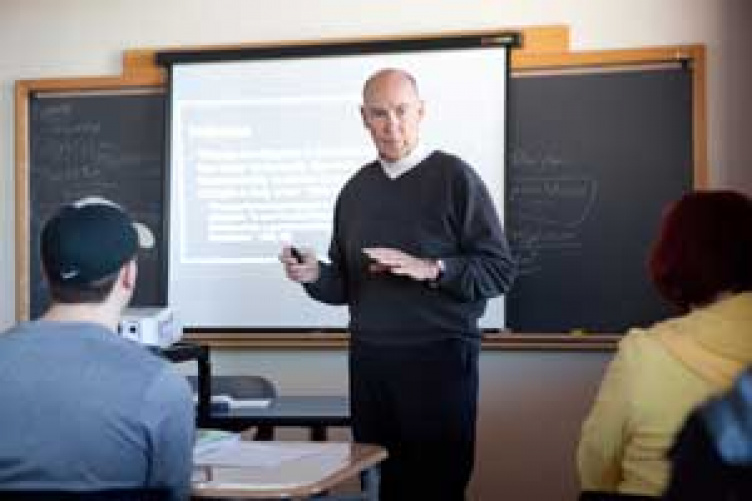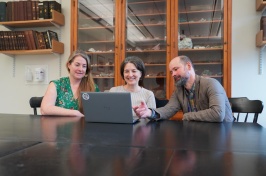
History faculty at the University of New Hampshire at Manchester want students to understand the many practical skills the study of history develops -- highly marketable skills, as it turns out, in the “information economy” students will enter upon graduation.
Historians graduating from UNH Manchester have certainly had great success moving on to what might be considered the conventional career tracks afforded by a history degree -- especially education, both at the college-level and the K-12 variety. But one of the program’s most distinguished alumni, Jim Piecuch, argues that the broad knowledge-base and critical-thinking skills the program imparts are far more practical, in far more ways, than is commonly recognized.
Piecuch was a 13-year veteran of the Manchester Fire Department when history courses at UNH Manchester sparked his interest in an entirely new career path. "I was encouraged by my professors there, John Cerullo and Jack Resch, to pursue graduate studies," he says. "Jack was particularly influential because I took his American Revolution course which was my first real foray into that area. And I just found it fascinating and turned my attention to that area." Piecuch went on to get his PhD, and is now an associate professor of history at Kennesaw State University near Atlanta, Georgia, and the author of four books on the American Revolution. But the point he stresses is that the practical benefits of an education in history are societal, as well as individual.
"Knowing the country's history makes you a better citizen, because it makes you a more informed citizen," he said. "Even the debates we engaged in in the most recent elections are just extensions of the same debates and disagreements and interpretations of what the United States should be that were being argued over since before the Constitution and as soon as the Constitution went into effect.
"So I think that's important, it also should make you a more analytical thinker." The cultivation of analytical rigor, along with high-level writing and research skills, was also of enormous practical benefit to another UNH Manchester history graduate, April Rheaume, who chose another career track commonly associated with history degrees: law. In her first year at the University of Arkansas Law School, Rheaume explains, the critical thinking, reading and especially writing skills she developed in the history program at UNH Manchester have proven invaluable.
"Law school can be pretty hard if you haven't done a lot of writing in the past," she said, emphasizing the amount of writing she did while studying history at UNH Manchester. But, she adds, the practical benefits of her undergraduate training in history extended further. “The critical thinking and critical reading skills have really helped,” Rheaume says, “especially when you have to read 1,000 pages a week." Rheaume’s academic training as an historian seems to have served her quite well: she has a full scholarship at UA Law, and is currently president of her class.
Teaching and law, along with government work, have been well recognized as career tracks for history majors for quite some time. But it turns out that alumni of UNH Manchester’s history program have been just as successful in less obvious career tracks, including the business world. The case of Greg Palladino illustrates why. Palladino is finishing an MBA at Rivier College while working in medical technology at the Elliot Medical Center in Manchester. He is enthusiastic in describing “What a leg-up the [history] program provided me” in the business world, arguing that “instead of just regurgitating facts, I was trained to think critically.”
Palladino believes strongly that college students preparing for careers in business should recognize “How ahead of the curve the liberal arts are.” He notes that “many of these Wall Street crooks are MBAs, which should prompt us across the U.S. to ask if something is missing in their curriculums.” That something, Palladino feels, is “educating the entire person -- as opposed to just, say, equipping X student with Y finance or accounting skills.”
Education, law, business: UNH Manchester history students have prospered in all these areas. And within the next year or so, UNH Manchester history program faculty intend to prepare students for even more options by introducing them to the fast-developing field of “public history.” Public history is defined, quite simply, as any communications of historical information and understanding to the public that happens outside of a conventional academic or “classroom” setting; the possibilities for a career in this field are expansive. According to history professor and program coordinator John Cerullo, examples include museum work, documentary films, archival and preservation work, even work in national parks.
“The public has an enormous appetite for history if it's presented in a digestible form," Cerullo said. "They don't want something superficial, but they don’t want something highly specialized either. Helping meet that demand in a responsible, professional way is the role that public historians have to play."
This, according to Cerullo, sometimes means broaching difficult and controversial subjects in ways that are truthful, yet tactful.
"When you are presenting something to the public you need to do it fairly," he said. "You can't sort of be pressured by interest groups. Yet sometimes you have to be mindful that these presentations are sponsored by public institutions. And a public historian has to know how to navigate these competing pressures."
Cerullo also noted that "UNH Durham has the only masters program in museum studies, one aspect of public history in northern New England," and that, with some undergraduate programming and mentoring by History faculty, history majors at UNH Manchester would be well situated to enter a “pipeline” for careers in this area. "So we are trying to move further down that road [in Manchester] because that is a very good career path for history students," Cerullo said. Currently there are no formal classes in “public history” offered at UNH Manchester. However, Cerullo said he and other department faculty envision a scenario within the next year or two where formal training in this area will be provided, possibly in partnerships with other departments.
"For example, digitization of archival materials and historic materials is a huge and coming field," Cerullo said. "This is an area where we could collaborate with other programs such as computer information systems, for instance. Just as we can collaborate with a program like communication arts when it comes to things like historical film."
"There are things that we can and will do to sort of sharpen people’s awareness of this area, and prepare them for careers in it,” Cerullo continued. While these plans are implemented, Cerullo said that the history program at UNH Manchester offers aspiring public historians the opportunity to secure some “on the job training” by conducting internships for academic credit with local historical societies, government agencies, businesses and even the university itself. “This is really a growth field,” Cerullo summed up.
For more information about the history program, contact John Cerullo, program coordinator, at (603) 641-4109, or jcerullo@unh.edu; or the UNH Manchester Office of Admissions at (603) 641-4150, unhm.admissions@unh.edu.
Originally published by:
UNH Today





















































